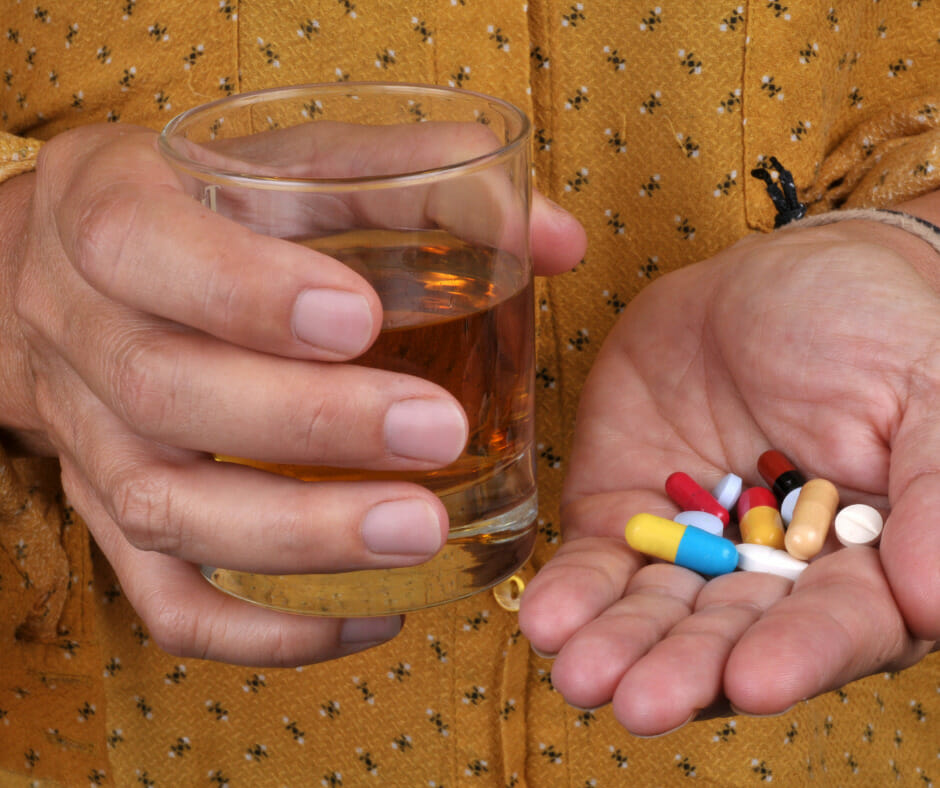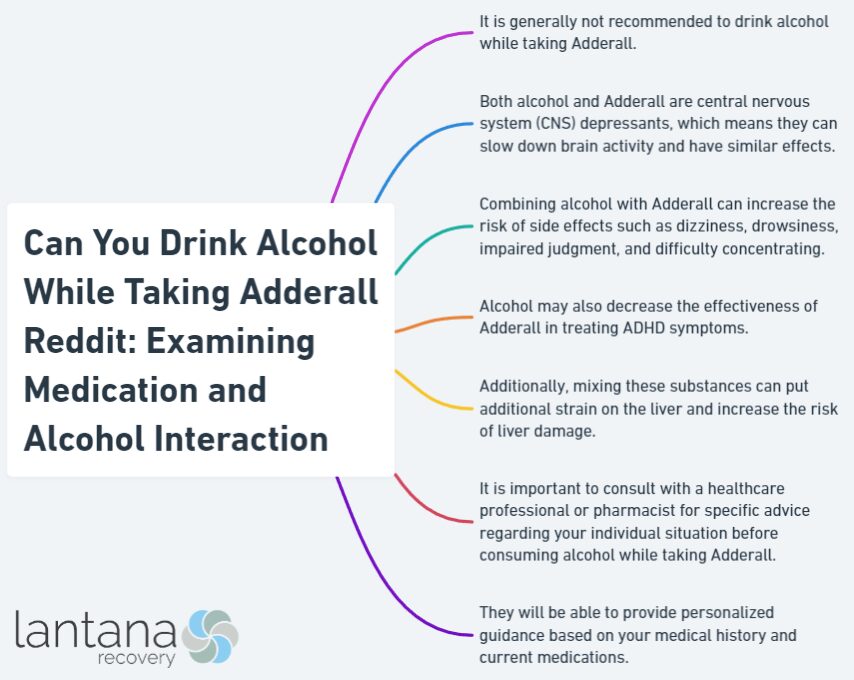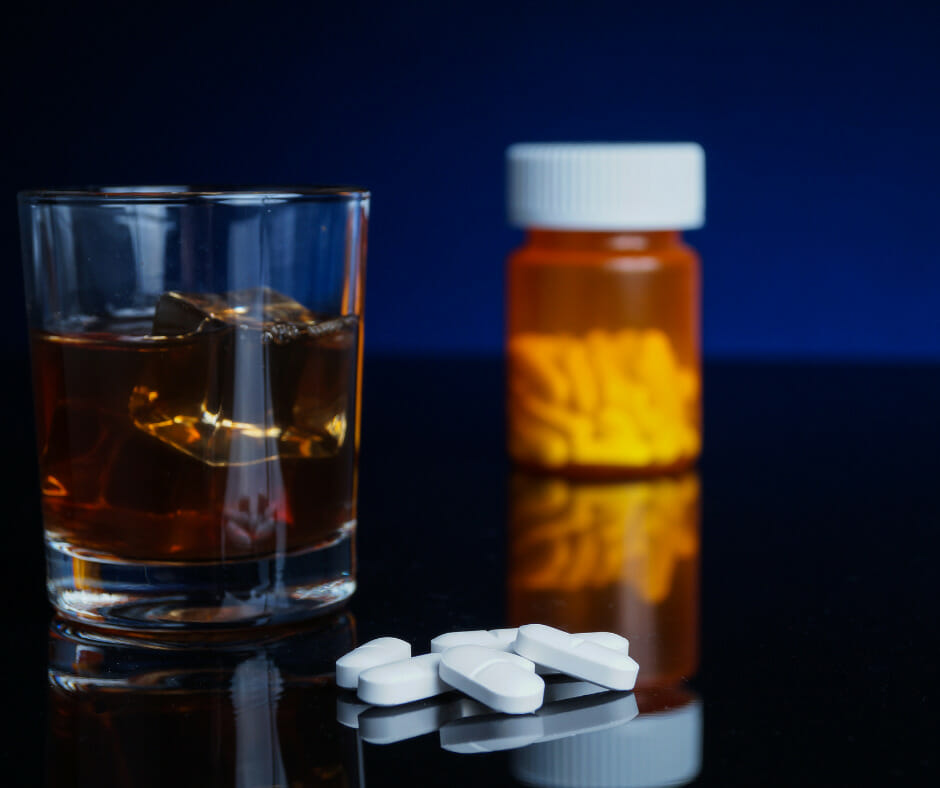
Understanding Adderall and Alcohol
Adderall, an ADHD medication, is classified as a stimulant, while alcohol is categorized as a depressant. It is important to note that combining these two substances can pose significant harm to one’s well-being.
Increased risk:
When Adderall and alcohol are combined, the possibility of experiencing negative side effects and health complications is heightened. These potential risks include an increased heart rate, elevated blood pressure, impaired judgment, and an elevated likelihood of engaging in risky behaviors.
Excessive stimulation:
Adderall is known for enhancing alertness and productivity, whereas alcohol can lower inhibitions and impair decision-making abilities. When these substances are combined, it can result in excessive stimulation and potentially dangerous situations.
Masking effects:
Alcohol has the ability to camouflage the effects of Adderall, making it challenging to accurately assess the medication’s true impact. This can inadvertently lead to unintentionally taking higher doses, which also increases the risk of experiencing adverse effects.
Counteracting benefits:
It is important to note that alcohol counteracts the therapeutic benefits of Adderall. By consuming alcohol, individuals may hinder the intended effects of the medication, rendering it less effective.
Individual differences:
The effects of combining Adderall and alcohol can vary greatly depending on factors such as dosage, physiology, and personal tolerance. It is critical to acknowledge that individuals may exhibit different sensitivities to these substances and their interactions.
To ensure one’s safety, it is crucial to consult with a healthcare professional or pharmacist before consuming alcohol while taking Adderall. These experts can offer personalized advice and guidance tailored to individual circumstances. Understanding the potential risks and interactions is vital for making informed decisions regarding one’s health and well-being.

What is Adderall?
“\What is Adderall? Adderall is a prescription medication that effectively treats attention deficit hyperactivity disorder (ADHD) and narcolepsy. Studies have shown that by containing amphetamine and dextroamphetamine, it has the ability to increase brain chemicals that directly impact focus and impulse control in individuals.”
Adderall serves as a central nervous system stimulant, providing a boost in alertness and attention, while concurrently reducing hyperactivity and impulsivity in patients with ADHD. This medication is available in immediate-release and extended-release forms.
In order to ensure proper usage, it is crucial to use Adderall under the supervision of a healthcare professional. It is categorized as a controlled substance due to the potential risks of abuse and dependence. The misuse or unauthorized usage of Adderall can lead to severe health consequences.
It is important to understand that while Adderall does not cure ADHD or narcolepsy, it can effectively manage symptoms. In order to achieve comprehensive treatment, additional interventions such as therapy and lifestyle changes may also be necessary.
Let me share a true story as an example: John, a teenager diagnosed with ADHD, was prescribed Adderall by his doctor to improve concentration and impulsivity. With proper guidance, Adderall significantly enhanced John’s focus and organization both in school and daily life. However, John also became aware of the potential dangers of misusing Adderall and combining it with alcohol. Consequently, he made the responsible choice to utilize the medication appropriately and incorporate healthy lifestyle practices, successfully navigating the challenges posed by ADHD and achieving his goals.”
What are the Effects of Adderall?
The effects of Adderall vary, but there are common effects when taking this medication.
– Adderall increases focus and attention by raising certain chemicals in the brain. It helps those with ADHD to improve their focus and attention.
– Adderall enhances concentration and helps individuals stay on task and ignore distractions.
– Adderall boosts energy levels, particularly helpful for individuals with ADHD who struggle with low energy.
– Adderall reduces impulsivity, one of the core symptoms of ADHD. The calming effects of Adderall help individuals think before acting and make better decisions.
– Adderall improves cognitive function, including memory and problem-solving abilities.
Please note that these are general effects and may vary. Adderall can also have side effects and risks, which should be discussed with a doctor before taking the medication. It is important to follow prescribed dosage and instructions for safe and effective use.
For more comprehensive information, consult a healthcare professional or trustworthy sources.
What is Alcohol?
“What is Alcohol? Alcohol is a beverage made from fermenting sugars in grains, fruits, or other sources. It is a colorless liquid that can cause intoxication when consumed excessively. When consumed, alcohol slows down brain activity and affects the body in different ways. It can induce relaxation, euphoria, and reduced inhibitions, but it also impairs coordination, judgment, and decision-making. Overconsumption of alcohol can result in addiction, liver damage, and other health problems. It’s important to remember that alcohol is a drug and should be consumed responsibly. Guidelines suggest that adults should drink moderately, which means no more than one drink per day for women and two drinks per day for men. Understanding the effects and risks of alcohol is crucial when making decisions about drinking. Personal health and well-being should always be prioritized, especially when considering potential interactions with medications or substances like Adderall.”
What are the Effects of Alcohol?
Alcohol affects the body and mind. Understanding the effects of alcohol is crucial before consuming it. Here are some facts about the effects of alcohol:
1. Alcohol acts as a depressant, slowing down brain activity and reaction times.
2. It impairs judgment, affecting decision-making and risk assessment.
3. Alcohol reduces coordination, leading to stumbling and loss of balance.
4. Slurred speech is a common effect of alcohol, making it difficult to articulate words properly.
5. Emotional changes can occur due to alcohol consumption, leading to impulsiveness and mood swings.
6. Memory problems may arise as alcohol impairs memory formation and retrieval.
7. Excessive alcohol consumption can have detrimental effects on physical health, such as liver damage, heart problems, and weakened immune system.
8. The symptoms of a hangover include headache, fatigue, nausea, and dehydration.
It is important to note that the effects of alcohol can vary based on individual tolerance levels and the amount consumed. If you have health conditions or take medications, it is recommended to either drink alcohol in moderation or avoid it altogether.

Can You Drink Alcohol While Taking Adderall?
Considering the potential risks and side effects, along with personal experiences and opinions, let’s dive into the burning question – Can you drink alcohol while taking Adderall? From recommendations and warnings to potential interactions, this section provides insights into the complex relationship between medication and alcohol and sheds light on the factors that should be considered before mixing the two.
Personal Experiences and Opinions
The interaction between Adderall and alcohol can have dangerous effects. Some individuals may experience increased energy or enhanced focus when combining these substances, but it is important to note that these effects are not safe or healthy. Medical professionals strongly advise against consuming alcohol while taking Adderall, as it can counteract the stimulant effects and lead to negative outcomes.
Personal opinions or experiences should not outweigh the warnings and recommendations provided by medical experts.
Combining Adderall and alcohol increases the risk of adverse side effects, including increased heart rate, elevated blood pressure, and impaired judgment. This combination also increases the likelihood of addiction or substance abuse. Prioritize your health and safety by following the guidelines from healthcare professionals. Consult with your healthcare provider for personalized guidance if you have any concerns.
“Additionally, mixing prescription stimulants with alcohol has pharmacological risks. Simultaneous administration of methylphenidate and alcohol produces the metabolite ethylphenidate. Even though the toxicity of ethylphenidate has yet to be fully specified, ethylphenidate was reported in two overdose victims who had ingested large quantities of methylphenidate with evidence of alcohol consumption,” reports a study published in Drug and Alcohol Dependence. (SIMULTANEOUS USE OF NON-MEDICAL ADHD PRESCRIPTION STIMULANTS AND ALCOHOL AMONG UNDERGRADUATE STUDENTS, Egan et al., 2013)
Recommendations and Warnings
When it comes to drinking alcohol while taking Adderall, there are recommendations and warnings that you should consider. It is important to note that these suggestions are based on factual information and not just subjective opinions.
1. It is highly recommended that you consult your doctor before consuming alcohol while on Adderall. Your doctor can provide personalized advice based on your medical history and condition.
2. It is generally advised to avoid alcohol while taking Adderall. Drinking alcohol can interfere with the effectiveness of the medication and increase the risk of experiencing side effects.
3. It is crucial to understand the potential risks associated with combining Adderall and alcohol. This combination can lead to an increased heart rate, elevated blood pressure, and intensified side effects. These serious health risks should be avoided.
4. If you decide to drink alcohol while on Adderall, it is important to follow the prescribed dosage instructions. This can help prevent any negative effects on your health.
5. It is important to consider your individual tolerance and reactions to alcohol when combined with Adderall. Pay attention to how your body responds and make decisions accordingly.
Prioritizing your health and well-being is crucial when it comes to drinking alcohol while taking Adderall. By following these recommendations and understanding the potential risks, you can ensure your safety and maximize the effectiveness of the medication.
To provide an example, let’s consider the true story of an individual who was prescribed Adderall for ADHD. Despite the warnings, they chose to consume alcohol at a social gathering. As a result, they experienced a significant increase in heart rate and extreme agitation. This experience highlighted the importance of adhering to the recommendations and warnings regarding alcohol consumption while on Adderall, as it can have serious physiological effects. They now prioritize their health and avoid alcohol when taking the medication.
Potential Risks and Side Effects
When consuming alcohol while taking Adderall, there are potential risks and side effects that should be considered. These include:
- Increased heart rate: Combining Adderall and alcohol can be dangerous, especially for individuals with pre-existing heart conditions.
- High blood pressure: Both Adderall and alcohol have the potential to raise blood pressure levels. Consuming them together can further elevate blood pressure and put one’s health at risk.
- Intensified side effects: The combination of Adderall and alcohol can amplify symptoms such as dizziness, confusion, impaired judgment, and increased risk-taking behavior.
- Impaired cognitive function: Alcohol is a depressant that impairs cognitive function. When combined with Adderall, it can lead to unpredictable and potentially dangerous effects.
- Increased risk of overdose: Mixing Adderall and alcohol can increase the risk of overdose since alcohol can mask the actual level of intoxication.
- Decreased effectiveness of medication: Alcohol can interfere with the effectiveness of Adderall, reducing its potency or rendering it ineffective.
- Liver damage: Both Adderall and alcohol can strain the liver. Consuming them together can heighten the risk of liver damage.
- Addiction and substance abuse: The combination of Adderall and alcohol can increase the likelihood of developing substance abuse issues or exacerbating existing addiction problems.
It is important to consult with a healthcare professional or pharmacist before consuming alcohol while taking Adderall, as individual experiences may vary.

Understanding Medication and Alcohol Interaction
Get ready to dive into the intriguing world of medication and alcohol interaction. In this section, we’ll explore how Adderall and alcohol interact in the body, the potential for increased risk of side effects, and even how this interaction can impact the effectiveness of the medication. So, buckle up and prepare for some eye-opening insights into this important subject matter. Let’s get started!
How Adderall and Alcohol Interact in the Body
Adderall and alcohol can interact in numerous ways, which can have a significant impact on a person’s well-being and health. Understanding these interactions is crucial for individuals who are taking Adderall and contemplating drinking alcohol. Here are some essential points to keep in mind regarding the interaction between Adderall and alcohol in the body:
1. Increased heart rate and blood pressure: Adderall is a stimulant that elevates heart rate and blood pressure. Alcohol, on the other hand, is a depressant that also affects cardiovascular functions. When combined, they can further escalate heart rate and blood pressure, potentially putting strain on the cardiovascular system.
2. Masking of effects: Adderall enhances alertness and reduces fatigue, while alcohol has sedating effects. The stimulating properties of Adderall might mask the sedative impact of alcohol, leading to underestimation of impairment.
3. Enhanced intoxication: Consumption of alcohol alongside Adderall can intensify the effects of alcohol intoxication. This can result in a higher tolerance for alcohol, potentially causing individuals to consume more than they typically would.
4. Dehydration: Both Adderall and alcohol contribute to dehydration. Adderall reduces saliva production, and alcohol acts as a diuretic, increasing urine production. The combination of these substances can exacerbate dehydration.
5. Liver function: The liver is responsible for metabolizing both Adderall and alcohol. When alcohol is consumed while taking Adderall, it can burden the liver, potentially affecting its ability to effectively process both substances.
It is important to note that these interactions can vary based on factors such as dosage, frequency of use, and overall health. Consulting with a healthcare professional is always recommended to ensure the individual’s safety and well-being when considering the interactions between Adderall and alcohol.
Increased Risk of Side Effects
When combining Adderall and alcohol, there is a heightened risk of experiencing side effects. The concurrent use of both substances can intensify their individual effects. Adderall, being a stimulant, enhances alertness and masks the sedative properties of alcohol. This combination also raises the likelihood of dehydration, dizziness, lightheadedness, and an elevated heart rate.
Furthermore, it can elevate blood pressure and strain the heart, potentially leading to heart complications. The liver is also at risk of damage, as both substances individually can have adverse effects on this organ, and the combination further amplifies this risk. Additionally, the mixture of Adderall and alcohol can have uncertain effects on cognitive function and decision-making.
Due to the aforementioned risks, it is strongly advised to refrain from combining these substances. For personalized guidance, it is advisable to consult with a medical professional.
Impact on Medication Effectiveness
Drinking alcohol while taking Adderall can significantly impact the effectiveness of the medication. Alcohol negatively interacts with many medications, including Adderall, thereby reducing its effectiveness. The combination of alcohol and Adderall can have contrasting effects on the body. While Adderall stimulates focus and energy, alcohol depresses brain activity. This combination can lead to confusion, dizziness, and impaired judgment.
Not only does alcohol counteract the effects of Adderall, but it also diminishes the medication’s effectiveness. Adderall is commonly prescribed for attention deficit hyperactivity disorder (ADHD) to enhance concentration and alertness. However, the presence of alcohol can hinder the medication from working properly, thereby diminishing its benefits.
Drinking alcohol while taking Adderall increases the risk of side effects. Both substances can cause dehydration and elevated heart rate, which can be problematic when combined. Additionally, alcohol is a central nervous system depressant. When combined with Adderall, it masks the sedative effects of alcohol, potentially resulting in excessive alcohol consumption and alcohol poisoning.
To ensure the effectiveness of Adderall and minimize risks, it is crucial to abstain from alcohol while taking the medication. It is recommended to discuss any concerns or questions about alcohol with a healthcare professional who can provide personalized advice and guidance.

Expert Opinions on Adderall and Alcohol Interaction
Curious about the interaction between Adderall and alcohol? Let’s dive into expert opinions on this intriguing topic. In this section, we’ll explore the views of medical professionals, along with their guidelines and recommendations regarding the use of Adderall and alcohol together. Get ready to gain valuable insights and better understand the potential effects and risks associated with combining these substances.
Medical Professionals’ Views
Medical professionals’ views generally advise against consuming alcohol while taking Adderall. The combination of Adderall and alcohol can have dangerous effects on the body. Alcohol can potentially decrease the effectiveness of Adderall as both substances work on the central nervous system. Additionally, Adderall can mask the sedative effects of alcohol, increasing the risk of alcohol poisoning and risky behaviors. Medical professionals strongly discourage the simultaneous use of Adderall and alcohol due to the potential for abuse, addiction, and negative consequences. It is important to consult with a healthcare provider or pharmacist for personalized advice on using Adderall and consuming alcohol, taking individual health conditions and medication dosages into account. Patients should always adhere to the prescribed dosage of Adderall and avoid exceeding recommended limits, as combining alcohol with higher doses of Adderall can have severe health implications.
If you are considering which is better, Adderall or Adderall XR, read our article on Adderall vs Adderall XR for a comparative analysis of the two.
Guidelines and Recommendations
When combining Adderall and alcohol, it is essential to follow these guidelines and recommendations:
- Avoid alcohol while taking Adderall to minimize side effects and reduce the risk of negative interactions.
- Consult a healthcare professional for personalized advice on potential interactions between Adderall and alcohol.
- Stick to the prescribed dosage of Adderall and avoid exceeding it to prevent severe health risks and dangerous side effects.
- Recognize that individual responses to medications and alcohol vary, and prioritize personal health and well-being.
- Pay close attention to Adderall prescription labels, warnings, and healthcare professional instructions to ensure safety.
- Stay informed about the latest research and recommendations on Adderall and alcohol interaction.
- If abstaining from alcohol proves difficult, explore healthier coping mechanisms or discuss alternative treatment options with a healthcare professional.
Always prioritize health and consult a healthcare professional for any concerns or questions about Adderall and alcohol interactions.
Frequently Asked Questions
Can You Drink Alcohol While Taking Adderall?
No, it is not recommended to drink alcohol while taking Adderall. Mixing alcohol and Adderall can have dangerous consequences and may lead to over-drinking, alcohol poisoning, heart problems, behavioral issues, and increased risk of substance abuse and addiction.
What are the risks of drinking alcohol while on Adderall?
Drinking alcohol while taking Adderall can mask the sedative effects of alcohol, leading to excessive drinking. It can also cause heart problems, increased body temperature, blood pressure, irregular heart rate, reduced inhibitions, aggressive behavior, and intensified effects of both substances. Combining alcohol and Adderall increases the risk of substance abuse and addiction.
Is it a common practice to combine alcohol and Adderall?
While it is not recommended, it is unfortunately a common practice, especially among young people in the United States, including college students. However, misusing Adderall and drinking alcohol together can have serious health consequences and should be avoided.
Can I use Adderall for cognitive enhancement while drinking alcohol?
No, using Adderall for cognitive enhancement is not recommended, particularly when combined with alcohol. The risks and potential harm outweigh any perceived benefits. It is important to take Adderall as prescribed and consult a doctor or pharmacist before considering any changes to your medication routine.
What are some healthy practices to follow while taking Adderall?
Some healthy practices to follow while taking Adderall include taking it as prescribed, avoiding alcohol and recreational drug use, maintaining a balanced diet, getting regular exercise, practicing stress-management techniques, and seeking support from medical professionals or peer support groups at an outpatient rehab.
Why is it important to consult a doctor or pharmacist before drinking alcohol after taking Adderall?
Consulting a doctor or pharmacist is important because they can provide personalized advice based on your specific medical condition, dosage, and treatment plan. They will be able to determine the appropriate waiting time before drinking alcohol after taking Adderall and advise on any potential interactions or risks involved.









